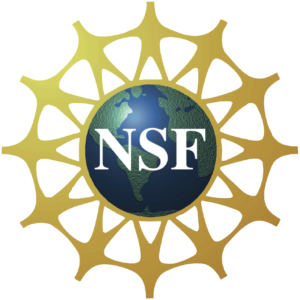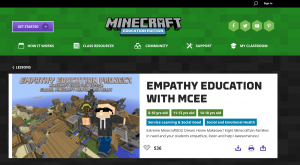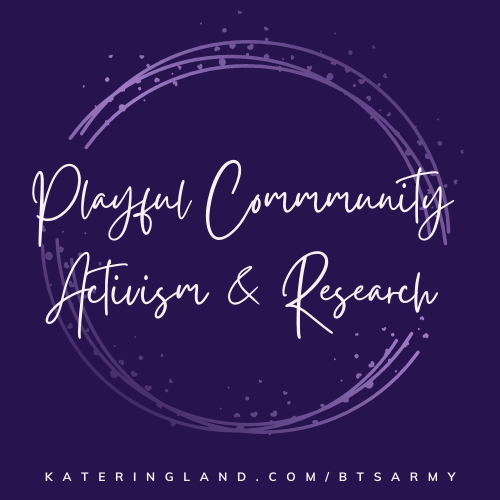Creator, Builder, Demystifying Inclusive Technology
Jump to Projects: Online Communities & Play | Disability & Games | Disability & Care | Education | Kaina Institute Projects

My research agenda creates access to community for marginalized individuals through specific technological and social design considerations. To accomplish this work, I form interdisciplinary research collaborations bringing together broad, diverse viewpoints, bodies of knowledge, and methods to answer complex research questions. I also deeply embed in communities, working in partnership with community members to solve their problems and reach their goals through community-based frameworks. In my work, I study pre-existing socio-technical systems, as well as build and study new systems. My research intersects the areas of assistive technology, games, and social computing.
Read more about my publications on my Publications page, including my Award Winning Publications from CHI, ASSETS, CSCW, and Ubicomp.
Online Communities & Play
Communities of Playful Caring, Understanding BTS ARMY (2020 – Present)
Collaborators: Tessa Eagle (UCSC), Breanna Baltaxe-Admony (UCSC), Kevin Weatherwax (UCSC), Kendra Shu (UCSC), Christine T. Wolf, Arpita Bhattacharya (UC Irvine)
Funding: UC President’s Postdoctoral Fellowship
This project is an ethnography of BTS ARMY across different social media platforms. I am leading a team of researchers to better understand the technological platforms that BTS and ARMY use to create their own special community. I am especially interested in how this impacts marginalized ARMY, such as disabled ARMY. We are looking to understand how playful online communities, such as fandoms, engage in forms of care and activism. In doing this, we hope to legitimize these communities as spaces for play and enjoyment, as well as care, relationship building, and civic engagement.
Publications
Kathryn E. Ringland, Arpita Bhattacharya, Kevin Weatherwax, Tessa Eagle, and Christine T. Wolf. 2022. ARMY’s Magic Shop: Understanding the Collaborative Construction of Playful Places in Online Communities. In Proceedings of the 2022 CHI Conference on Human Factors in Computing Systems. [PDF][BLOG]
Kathryn E. Ringland and Christine T. Wolf. 2022. “You’re my best friend.”: finding community online in BTS’s fandom, ARMY. XRDS 28, 2 (Winter 2021), 66–69. [PDF]
An Ethnography of a Minecraft Virtual World Community for Children with Autism (2014 – 2018)
Social media, including virtual worlds, has the potential to support children with autism in making friendships, learning pro-social behavior, and engaging in collaborative play with their peers. However, currently, little is known about how children with autism interact socially in online spaces. Furthermore, there is much more to learn about how technology can support these collaborative interactions. In this study, I propose investigating how a virtual world can be intentionally run alongside other complementary social media (e.g., website, forum, Facebook, Twitter, and Google+) specifically for children with autism. The contribution of this work is to create design guidelines for creating social media systems (including virtual worlds) to support social interactions of children with autism.
Publications
Kathryn E. Ringland. 2019. “Do you work for Aperture Science?”: Researching and Finding the Gamer Identity in a Minecraft Community for Autistic Children. In FDG 2019. [PDF] [BLOG]
Kathryn E. Ringland. 2019. A Place to Play: The (Dis)Abled Embodied Experience for Autistic Children in Online Spaces. In CHI 2019. [PDF] [BLOG]
Kathryn E. Ringland. 2019. “Autsome”: Fostering an Autistic Identity in an Online Minecraft Community for Youth with Autism. In iConference 2019 Proceedings. [PDF] [BLOG]
Kathryn E. Ringland, LouAnne Boyd, Heather Faucett, Amanda L.L. Cullen, Gillian R. Hayes. Making in Minecraft: A Means of Self-Expression for Youth with Autism. In IDC 2017. [PDF] [BLOG]
Kathryn E. Ringland, Christine T. Wolf, LouAnne E. Boyd, Mark Baldwin, and Gillian R. Hayes. 2016. Would You Be Mine: Appropriating Minecraft as an Assistive Technology for Youth with Autism. In ASSETS 2016. [Acceptance Rate: 25%]. Best Paper. [PDF][BLOG]
Ringland, K. E., Wolf, C. T., Faucett, H., Dombrowski, L., & Hayes, G. R. (2016). “‘Will I always be not social?’: Re-Conceptualizing Sociality in the Context of a Minecraft Community for Autism”. In Proceedings of ACM CHI Conference on Human Factors in Computing Systems 2016. [Acceptance Rate: 23.4%]. [PDF][BLOG]
Ringland, K.E., Wolf, C.T., Dombrowski, L., and Hayes, G.R. “Making ‘Safe’: Community-Centered Practices in a Virtual World Dedicated to Children with Autism”. Proceedings of the 2015 ACM International Conference on Computer Supported Collaborative Work, ACM (2015). [Acceptance Rate: 28.3%]. [PDF][BLOG]
Ringland, K.E., Wolf, C.T., Hayes, G.R. (2015, May 15). “The Benefits of Online Play: An Investigation of Virtual Worlds for Children with Autism Spectrum Disorder”. International Meeting for Autism Research Salt Lake City, Utah.
Ringland, K.E., Hayes, G.R. (2014, April 27). “Virtual Worlds: An Alternative Method for Communication for Children with Autism Spectrum Disorder”. Workshop: Supporting Children with Complex Communication Needs. ACM SIGCHI Conference on Human Factors in Computing Systems. Toronto, Canada. [PDF]
Disability & Games
Representation of Disability in (Social) Media (2018 – Present)
Collaborators: Amanda Cullen (University of California Irvine), Christine T. Wolf
How disability and marginalized bodies are represented in media, particularly video games, impacts the players in a variety of ways. In this thread of my research, I investigate how disability is represented in video games and how using a disability-centered lens illuminates new ways to understand these representations.
Publications
Cullen, A.L.L., Ringland, K.E., Wolf, C.T. “A Better World: Examples of Disability in Overwatch.” First Person Scholar. 2018.
Cullen, A.A. (Chair, Presenter), Stang, S. (Co-chair, Presenter), Ringland, K.E. (Presenter), Cruikshank, L. (Presenter). “Maternal and Pregnant Bodies in Games.” “Expecting the Best: Disability, Medicalization, and the Pregnant Body as Object in Video Games.” Society for Cinema & Media Studies. Organized Panel. March 2021. Chicago, IL.
Disability & Care
Designing for Digital Mental Health (2018 – 2020)
Collaborators: Madhu Reddy (Northwestern University), David Mohr (Northwestern University)
Funding: National Institute of Mental Health (T32MH115882)
My past research has worked within the field of assistive technology, but the health field has been working on similar research questions. As a postdoctoral fellow in the Center for Behavioral Intervention Technologies, I can enhance my research agenda by addressing the following question: How can the fields of digital mental health and assistive technology work together to inform the design of tools for individuals with mental health challenges and psychosocial disabilities? Clinical researchers have created tools to help support individuals with depression that have been proven effective through clinical trials, but long-term adoption of these tools remains elusive. While people with depression may not be using current tools built specifically to support treating depression, they are appropriating mainstream technology to meet their needs. In continuation of my community-based work, this project is two-pronged: 1) partnering with care managers to provide more support for patients and 2) working with individuals with depression to understand their goals and needs.
Designing to Support Individuals with Depression (2018 – 2020)
Collaborators: Alice Zhang (Student Lead, Northwestern University), Madhu Reddy (Northwestern University), David Mohr (Northwestern University)
While there are apps and tools for individuals with depression, there is still a gap in the research-to-practice pipeline. In this project, through elicitation workshops and interviews, we investigate how individuals with depression currently use technology to support their mental health care and what their goals are in their mental health care. A key contribution of this work will be to understand how these goals align (or not) with medical care professionals in order to create tools and services that will be adopted into daily use.
Publications
Zhang, R., Ringland, K.E., Paan, M., Mohr, D.C., Reddy, M. “Designing for Emotional Well-being: Integrating Persuasion and Customization into Mental Health Technologies.” In Proceedings of CHI 2021.
Nicholas, J., Ringland, K.E.., Graham, A.K., Knapp, A.A., Lattie, E.G., Kwansy, M.J., & Mohr, D.C. “Stepping up: Predictors of ‘stepping’ within an iCBT stepped-care intervention for depression.” In International Journal of Environmental Research and Public Health. November 2019.
DanceCraft (2014 – 2016)
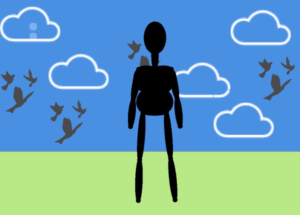
Collaborators: Jamie Brown, Christine Wolf, LouAnne Boyd, Kimberley Lakes, Andrew Palermo, Mark Baldwin, Gillian Hayes
Currently, therapists use dance therapy to stimulate the various senses in children with autism to help reduce atypical movement and to increase engagement in the activity. DanceCraft is a system developed to further the aims of dance therapy by increasing the children’s body awareness. We will be exploring how the software engenders different interactions styles to help inform the design of future systems focused on using body based movements to support dance therapy.
Publications
Kathryn E. Ringland, Christine T. Wolf, LouAnne E. Boyd, et al. 2019. DanceCraft: A Whole-body Interactive System for Children with Autism. ASSETS 2019, ACM.
SensoryPaint (2013 – 2015)
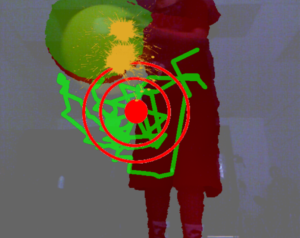
Collaborators: Megan Neal, Rodrigo Zalapa, Lizbeth Escobedo, Monica Tentori, Gillian Hayes
Many children with neurodevelopmental disorders, such as autism spectrum disorder, have sensory processing disorders (SPD), which can lead to inappropriate behaviors and impairments. One therapeutic approach to the kinds of SPD frequently observed in children with neurodevelopmental disorders involves the use of a variety of tools including objects with various textures and tactile sensations, mirrors, and Multisensory Environments (MSE) saturated with visual and audible stimuli and specialized equipment for sensory stimulation. However, children with SPD each have a unique prescription for the amount of stimulation they require for the therapy to be effective. MSE must be physically altered before each child receives therapy.
Publications
Education
Minecraft for Mixed Ability Play (2020 – Present)
Collaborators: Elizabeth Kozleski (Stanford University), Nick Haber (Stanford University)
Funding: Transforming Learning: Seed grants for research on K-12 education in the time of COVID-19
We propose building a new learning community that operates on the principle that the best and most engaging learning is through play. Minecraft is an online game environment that has limitless possibilities for same-age peers to engage in digital learning through communities of practice. Autcraft, an online community for children with autism that lives in Minecraft, offers an example of what we intend to create: a space for peer play and learning that captures the
power of collaboration between learners of all abilities as they seek to create their own play space using imagination, analysis, communication, and problem solving skills.
Minecraft Education Edition: Lesson Crafting (2019 – Present)
Collaborators: David Bar-El (Student Lead, Northwestern University)
While Digital Game-Based Learning has a long history in scholarly literature, there is still a dearth of research in how teachers create lessons within these digital spaces. This project examines Minecraft Education Edition and teacher-created lessons to understand what kinds of lessons teachers are creating for their students and how these lessons are being created.
Publications
Bar-El, D., Ringland, K.E.. “Teachers Designing Lessons with a Digital Sandbox Game: The Case of Minecraft Education Edition.” In European Conference on Games Based Learning 2021.
Kaina Institute for Equitable Research Projects
Indigenous Activism on Social Media (2019 – Present)
Collaborators: Annie Forsman-Adams (Kaina Institute for Equitable Research)
The history of violence in indigenous communities is the root of many contemporary challenges. Domestic violence and access to mental health care are two (often interrelated) problems that disproportionately impact indigenous people, and indigenous women, in particular. Currently, efforts to provide access to resources and support have been through increasing clinics to rural areas and diversifying the caregivers themselves (e.g., increase indigenous clinicians in order to ensure cultural competence). However, these solutions focus on taking the western ideas of healthcare and trying to fit indigenous ideologies and cultures into that framework. Rather than relying on a solely Western lens, we propose turning back to the roots of indigenous culture, with healing and care that grows out of storytelling. Through storytelling, valuable lessons are taught. Likewise, games have their own storytelling aspects that allow individuals to explore identity in a safe environment (e.g., through roleplaying).
Publications
Collaborations
I have been fortunate enough to work at a number of world-class universities.
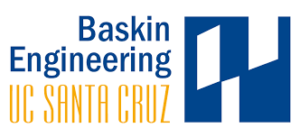





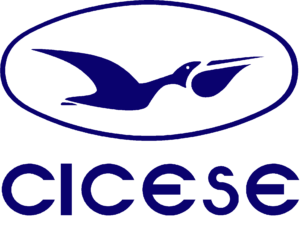

Funding
My work would not be possible without generous support.


